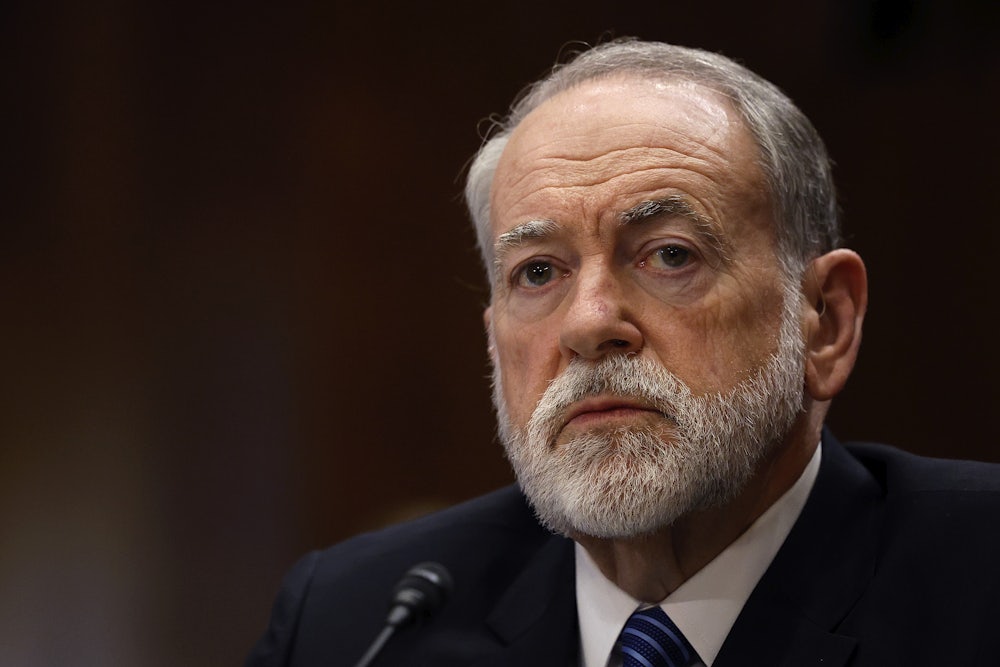Last week’s Senate confirmation hearing for former Arkansas Governor Mike Huckabee to be Donald Trump’s ambassador to Israel contained one astonishing moment that no one seems to have noticed. Responding (or rather trying to avoid responding) to a question from Maryland Senator Chris Van Hollen about whether Palestinians living in the West Bank should have the same rights as Israeli Jews who live there, Huckabee, after a series of evasions, finally responded: “Senator, if you mean would they be able to live freely, they already do.”
Even the most dedicated pro-Israel advocates would not try to argue that the Palestinians “live freely” in the occupied West Bank. Rather, they argue that the maze of restrictions, checkpoints, multiple permit requirements, and daily humiliation and harassment that Palestinians face under Israeli military rule (which the world’s most prominent human rights organizations have argued meets the definition of apartheid, a view with which the International Court of Justice concurred in 2024) are a regrettable necessity to keep Israelis safe from Palestinian violence (always, of course, refusing to acknowledge that the main driver of violence is the occupation itself).
Regardless of anything else about Huckabee, what he believes, or what he has said, that one sentence should immediately disqualify him from confirmation as ambassador. It won’t, of course. (The Senate Foreign Relations Committee on Wednesday advanced his nomination on a party-line vote.) But it’s worth considering what the choice of such a person to serve as ambassador to one of America’s closest security partners means for U.S. policy in the world’s most volatile region, and what it says about our current politics.
I’ve heard from a couple sources that Huckabee’s nomination, which was one of Trump’s first announcements in the heady days immediately after he won reelection, was done as a favor to Huckabee’s daughter, Sarah Huckabee Sanders, Trump’s first-term press spokesperson and now governor of Arkansas. As is so often the case with Trump, not a lot of thought was put into the choice, so it’s probably a good idea not to delve too deeply into what it means. For the moment at least, Trump’s Middle East policy will continue to be led by his friend and real estate mogul Steve Witkoff and will be aimed primarily at advancing Trump’s own personal interests.
Having said that, it is clarifying to have someone like Huckabee as a nominee for this job. While groups like the American-Israel Public Affairs Committee, or AIPAC, are usually what people think of when discussing the “pro-Israel lobby,” it’s Christian evangelicals like Mike Huckabee who form the vast majority of the country’s pro-Israel constituency. AIPAC is effective at working the halls of Congress, but evangelicals are overwhelmingly the ones who show up at the voting booth.
I grew up in the same evangelical faith that Huckabee is from, where support for Israel was simply part of the culture. It was just accepted that the establishment of the State of Israel in 1948 was a fulfillment of biblical prophecy, heralding the Last Days and the Second Coming of Jesus Christ. In Sunday school, we performed plays from the Old Testament. For evangelical Christians, this history was seen as part of our own history, and the miracle of the modern State of Israel taken as proof that God continued to work in the world.
The Palestinians … who were they? They didn’t figure into it. They were invisible. Huckabee’s prepared opening remarks at his hearing last week reflect this mentality—they do not include the word “Palestinian.” This is unsurprising given that he has repeatedly stated that he does not believe the Palestinians are a real people.
Huckabee was way ahead of the curve on population transfer (not just for Gaza, as Trump has proposed, but for all Palestinians), telling an Israeli website almost 20 years ago that he supported creating a Palestinian state but believes that it should be formed outside of Israel, which he defines as all of the land between the river and the sea, pre-1967 Israel as well as the occupied territories of East Jerusalem, the West Bank, Gaza, and the Golan Heights. He named Egypt and Saudi Arabia as possible alternatives, noting that the Arabs of the region have far more land than the Israelis and that it would only be fair for other Arab nations to give the Palestinians land for a state, rather than carving it out of what he sees as Israel’s rightful territory.
Is there any other country in the world where the United States would even consider appointing an ambassador who has publicly supported expelling half of its residents? (Palestinians make up almost 21 percent of the population of Israel but about half of the population of both Israel and Palestine, all of which Huckabee considers “Israel.”) Of course there isn’t. But because Washington’s policy conversation about Israel and Palestine exists in a magical fantasy land, none of this will matter. As with his predecessor in the previous Trump administration (Trump’s bankruptcy lawyer David Friedman), Huckabee will downplay his extremist views just enough for the required number of Democrats to justify a cowardly vote for his confirmation.
But we should recognize that, whoever the ambassador is, a policy that sidelines Palestinian aspirations, or treats them as invisible, will inevitably fail. The Biden administration found this out on and after October 7. The Trump administration seems intent on making the same mistake again.






